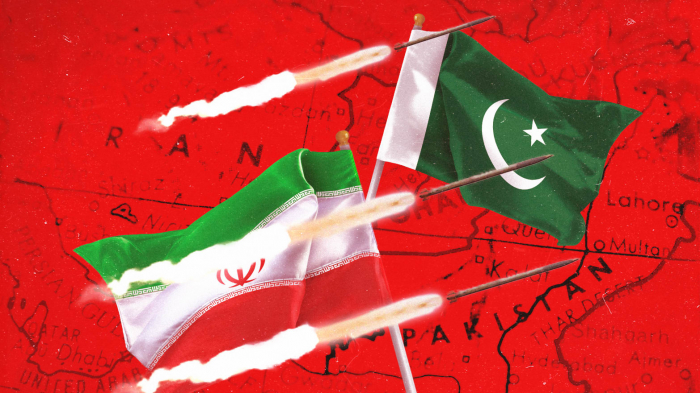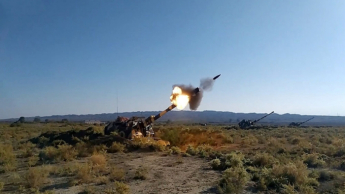Why does Iran irritate its neighbors by showing a hostile attitude?

|

Iran's violation of Pakistan's territory received a swift and fitting response from Pakistan within less than 24 hours. Pakistan initiated "Operation Marg Bar Sarmachar" and struck terrorist hideouts in Iran's Sistan-o-Baluchistan province. The intelligence-based operation resulted in the elimination of several terrorists.
Pakistan and Iran typically enjoy amicable neighborly relations. However, Iran's long-standing pursuit of expansionism has been raising concerns among its neighboring countries. Ironically, despite being an orthodox Muslim state, Iran is alleged to have supported the orthodox Christian nation of Armenia against the predominantly Muslim state of Azerbaijan. This support was evident before, during, and after the 44-day Patriotic War. In this conflict, Azerbaijan emerged victorious, reclaiming its territories illegally occupied by Armenia.
A peculiar situation unfolded in July 2023 when Azerbaijani authorities captured footage of an automobile convoy. This convoy, transporting Indian weapons to Armenia, passed through Iran's Norduz border checkpoint. The video showed cargo vehicles covered with awnings, presumably to hide their contents, traveling through Iran after arriving at the Iranian port of Bandar Abbas. These vehicles were carrying Indian military equipment intended for Armenia. India has not only been supplying weapons used against Azerbaijan but has also provided technical military support. The video footage unequivocally confirmed that India had begun to channel weapons and military equipment to Armenia via Iran. Azerbaijan has repeatedly and vehemently cautioned New Delhi about the unacceptable nature of rearming Armenians.
Azerbaijan's concerns were raised at every possible opportunity, including during the May 2023 credential acceptance ceremony of the new Indian Ambassador, Sridharan Madhusudhanan. During this event, Azerbaijani President Ilham Aliyev directly addressed the issue with Ambassador Madhusudhanan. President Aliyev expressed concern about the rapid armament of Armenia, questioning its intentions for peace with Azerbaijan and highlighting the potential for hundreds of millions of dollars worth of weapons to create new dangers. He emphasized that such policies could lead to heightened threats in the region. Regrettably, Iran's involvement in the weaponization of Armenia has contributed to escalating regional tensions.
Several Caucasian think tanks have released reports raising alarms about Iran's ambitions to establish regional dominance, which they deem excessively perilous. Following its expansion of influence across the Middle East, Iran is now perceived as a threat to its Caspian neighbors. Iran appears to be collaborating with India's strategy to extend its influence to the Caspian region. Instead of focusing solely on the Caucasian area, Iran is attempting to exert control over certain Central Asian states. Regional experts support Pakistan's concern that India has been exploiting Iranian territory to instigate terrorism within Pakistan.
The February 2016 apprehension of Kul Bhushan Jadhav, an agent of India's Research and Analysis Wing (RAW), did not astonish regional analysts, who had already noticed indications of Indian espionage operations in Iran. Jadhav, alias Husain Mubarak Patel, resided in Iran. He entered the Indian National Defence Academy in 1987, joined the engineering branch of the Indian Navy in 1991, and after 14 years, shifted to intelligence work in 2003, establishing a business in Chabahar, Iran. In a confessional statement broadcast in Pakistan, Jadhav admitted entering Pakistan illegally from Iran and engaging in subversive activities in Balochistan and Karachi.
Concerns mirror those of some Azerbaijani think tanks, which suspect Iran of facilitating Armenian intelligence operations against Azerbaijan. Additionally, certain Turkish think tanks speculate that Iran monitors Turkish military movements. This situation underscores the view that Iran, rather than maintaining friendly relations and assisting its neighbors, poses a continuous threat to all regions it is connected with by land.
Iran's foreign policy activities include involvement in Armenian aggression against Azerbaijan, maneuvering geopolitics in the Middle East, injecting resources into Central Asian states, and purportedly aiding India in destabilizing Pakistan's security in South Asia. Iran's confidence in these endeavors has grown since establishing a strategic partnership with China. Iran's recent provocative acts involved unprovoked drone and rocket attacks in Pakistan's Balochistan province. Pakistan denounced these strikes as a flagrant violation of its sovereignty and an infringement of international law, including the United Nations Charter. Pakistan's interim Foreign Minister characterized the Iranian aggression as causing "serious damage to bilateral ties between Pakistan and Iran."
Within a span of less than 24 hours, Pakistan executed a series of meticulously coordinated and precisely targeted military strikes against terrorist hideouts in Iran's Sistan-o-Baluchistan province. The operation, named 'Marg Bar Sarmachar', resulted in the elimination of several terrorists. These actions were based on intelligence gathered for the operation.
Pakistan's Foreign Office has stated that, over the past few years, it has consistently communicated its grave concerns regarding the sanctuaries and safe havens used by terrorists of Pakistani origin, known as Sarmachars, in the ungoverned areas within Iran. Pakistan had also submitted multiple dossiers providing solid evidence of these terrorists' presence and activities.
However, due to the absence of responsive actions, the Sarmachars continued their attacks on innocent Pakistanis with impunity. Consequently, Pakistan undertook these strikes inside Iran following intelligence about imminent large-scale terrorist activities. The Foreign Office emphasized that Pakistan is committed to taking all necessary measures to ensure the safety and security of its people, which it regards as paramount, inviolable, and sacred.
This event marks a significant departure from Pakistan's historical policy of restraint. Pakistan respects the sovereignty and territorial integrity of the Islamic Republic of Iran and has traditionally viewed Tehran as a longstanding ally. However, feeling betrayed by recent developments, Islamabad has decided to reciprocate Tehran's actions in kind. The Pakistani Foreign Office clarified that the primary objective of these strikes was to protect Pakistan's own security and national interests, which are of utmost importance and non-negotiable.
As a responsible member of the international community, Pakistan adheres to the principles and purposes of the UN Charter, including the territorial integrity and sovereignty of member states. Nonetheless, Pakistan cannot permit any challenge to its sovereignty and territorial integrity.
While Iran is considered a fraternal country and the Pakistani people hold deep respect and affection for the Iranian people, this does not imply that aggression from any nation will be tolerated, regardless of historical, ethnic, or religious connections.
It is evident that numerous hideouts of Baloch terrorists exist in Iran, which have facilitated multiple cross-border incursions into Pakistan. The Balochistan Liberation Front (BLF) and the Balochistan Liberation Army (BLA) have been responsible for numerous attacks on Pakistani security forces and civilians.
Pakistan has repeatedly raised this issue with Iran, but the Iranian response has been inadequate, with no substantial action taken against these terrorists and their hideouts. Many leaders of these Baloch terrorist organizations have reportedly been residing in Iran with their families. Pakistan received reliable intelligence indicating that these Baloch terrorists were planning major terrorist activities within Pakistan. Based on this confirmed intelligence, Pakistan targeted these terrorist hideouts in self-defense, aiming to prevent further terrorism originating from Iranian soil.
The author is Editor-in-chief of DND news agency.
(If you want to contribute and have specific expertise, please contact us at [email protected])
The Rocket and Artillery formations of the Azerbaijan Army conduct live-fire exercises in accordance with the combat training plan for 2021, the Ministry of Defense of Azerbaijan told Baku Tribune.
LAST NEWS





.jpg&h=67&w=67&zc=1&q=100)













